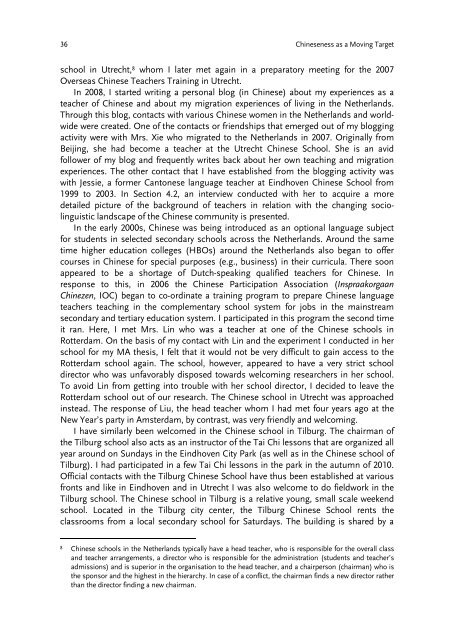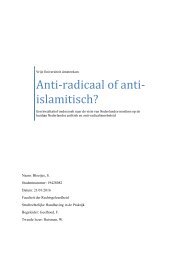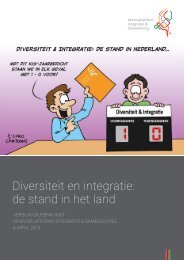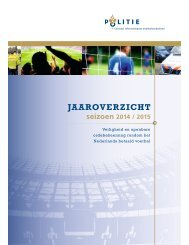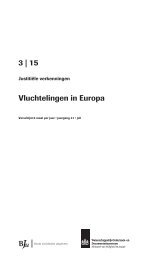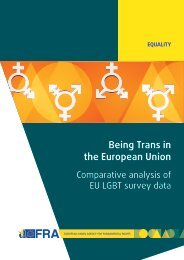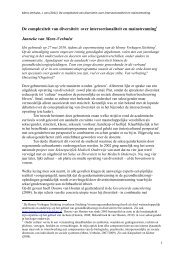Tilburg University Chineseness as a Moving Target Li Jinling
Li_Chineseness_12_09_2016
Li_Chineseness_12_09_2016
You also want an ePaper? Increase the reach of your titles
YUMPU automatically turns print PDFs into web optimized ePapers that Google loves.
36 <strong>Chineseness</strong> <strong>as</strong> a <strong>Moving</strong> <strong>Target</strong><br />
school in Utrecht, 8 whom I later met again in a preparatory meeting for the 2007<br />
Overse<strong>as</strong> Chinese Teachers Training in Utrecht.<br />
In 2008, I started writing a personal blog (in Chinese) about my experiences <strong>as</strong> a<br />
teacher of Chinese and about my migration experiences of living in the Netherlands.<br />
Through this blog, contacts with various Chinese women in the Netherlands and worldwide<br />
were created. One of the contacts or friendships that emerged out of my blogging<br />
activity were with Mrs. Xie who migrated to the Netherlands in 2007. Originally from<br />
Beijing, she had become a teacher at the Utrecht Chinese School. She is an avid<br />
follower of my blog and frequently writes back about her own teaching and migration<br />
experiences. The other contact that I have established from the blogging activity w<strong>as</strong><br />
with Jessie, a former Cantonese language teacher at Eindhoven Chinese School from<br />
1999 to 2003. In Section 4.2, an interview conducted with her to acquire a more<br />
detailed picture of the background of teachers in relation with the changing sociolinguistic<br />
landscape of the Chinese community is presented.<br />
In the early 2000s, Chinese w<strong>as</strong> being introduced <strong>as</strong> an optional language subject<br />
for students in selected secondary schools across the Netherlands. Around the same<br />
time higher education colleges (HBOs) around the Netherlands also began to offer<br />
courses in Chinese for special purposes (e.g., business) in their curricula. There soon<br />
appeared to be a shortage of Dutch-speaking qualified teachers for Chinese. In<br />
response to this, in 2006 the Chinese Participation Association (Inspraakorgaan<br />
Chinezen, IOC) began to co-ordinate a training program to prepare Chinese language<br />
teachers teaching in the complementary school system for jobs in the mainstream<br />
secondary and tertiary education system. I participated in this program the second time<br />
it ran. Here, I met Mrs. <strong>Li</strong>n who w<strong>as</strong> a teacher at one of the Chinese schools in<br />
Rotterdam. On the b<strong>as</strong>is of my contact with <strong>Li</strong>n and the experiment I conducted in her<br />
school for my MA thesis, I felt that it would not be very difficult to gain access to the<br />
Rotterdam school again. The school, however, appeared to have a very strict school<br />
director who w<strong>as</strong> unfavorably disposed towards welcoming researchers in her school.<br />
To avoid <strong>Li</strong>n from getting into trouble with her school director, I decided to leave the<br />
Rotterdam school out of our research. The Chinese school in Utrecht w<strong>as</strong> approached<br />
instead. The response of <strong>Li</strong>u, the head teacher whom I had met four years ago at the<br />
New Year’s party in Amsterdam, by contr<strong>as</strong>t, w<strong>as</strong> very friendly and welcoming.<br />
I have similarly been welcomed in the Chinese school in <strong>Tilburg</strong>. The chairman of<br />
the <strong>Tilburg</strong> school also acts <strong>as</strong> an instructor of the Tai Chi lessons that are organized all<br />
year around on Sundays in the Eindhoven City Park (<strong>as</strong> well <strong>as</strong> in the Chinese school of<br />
<strong>Tilburg</strong>). I had participated in a few Tai Chi lessons in the park in the autumn of 2010.<br />
Official contacts with the <strong>Tilburg</strong> Chinese School have thus been established at various<br />
fronts and like in Eindhoven and in Utrecht I w<strong>as</strong> also welcome to do fieldwork in the<br />
<strong>Tilburg</strong> school. The Chinese school in <strong>Tilburg</strong> is a relative young, small scale weekend<br />
school. Located in the <strong>Tilburg</strong> city center, the <strong>Tilburg</strong> Chinese School rents the<br />
cl<strong>as</strong>srooms from a local secondary school for Saturdays. The building is shared by a<br />
8<br />
Chinese schools in the Netherlands typically have a head teacher, who is responsible for the overall cl<strong>as</strong>s<br />
and teacher arrangements, a director who is responsible for the administration (students and teacher’s<br />
admissions) and is superior in the organisation to the head teacher, and a chairperson (chairman) who is<br />
the sponsor and the highest in the hierarchy. In c<strong>as</strong>e of a conflict, the chairman finds a new director rather<br />
than the director finding a new chairman.


